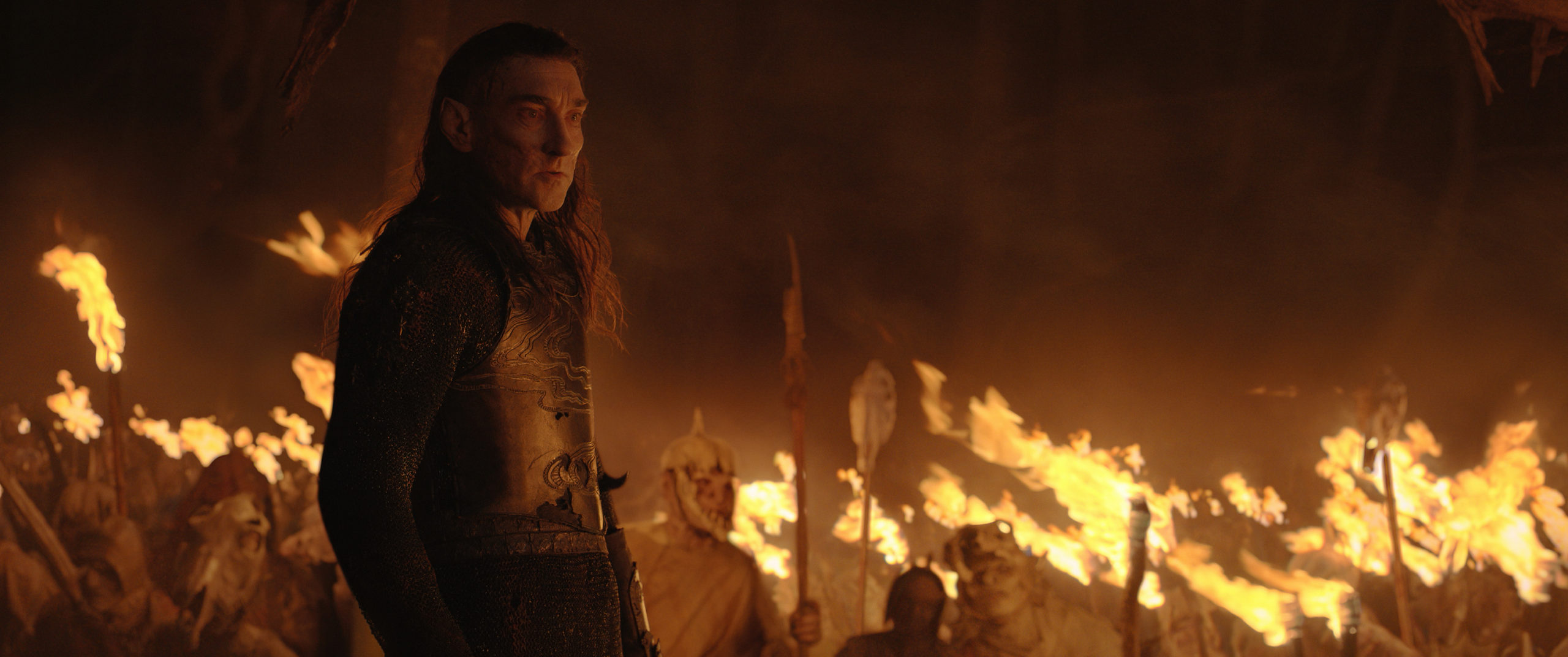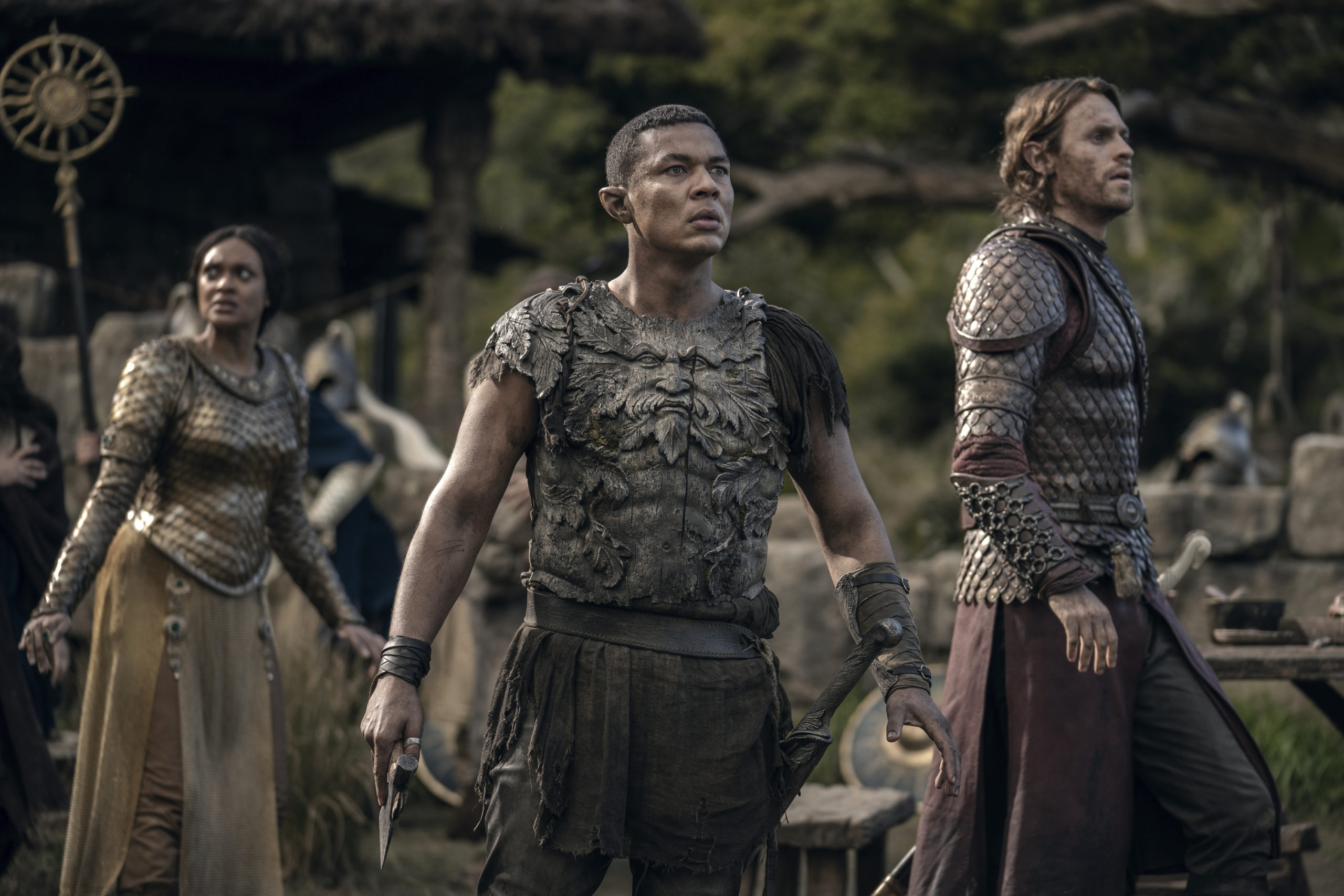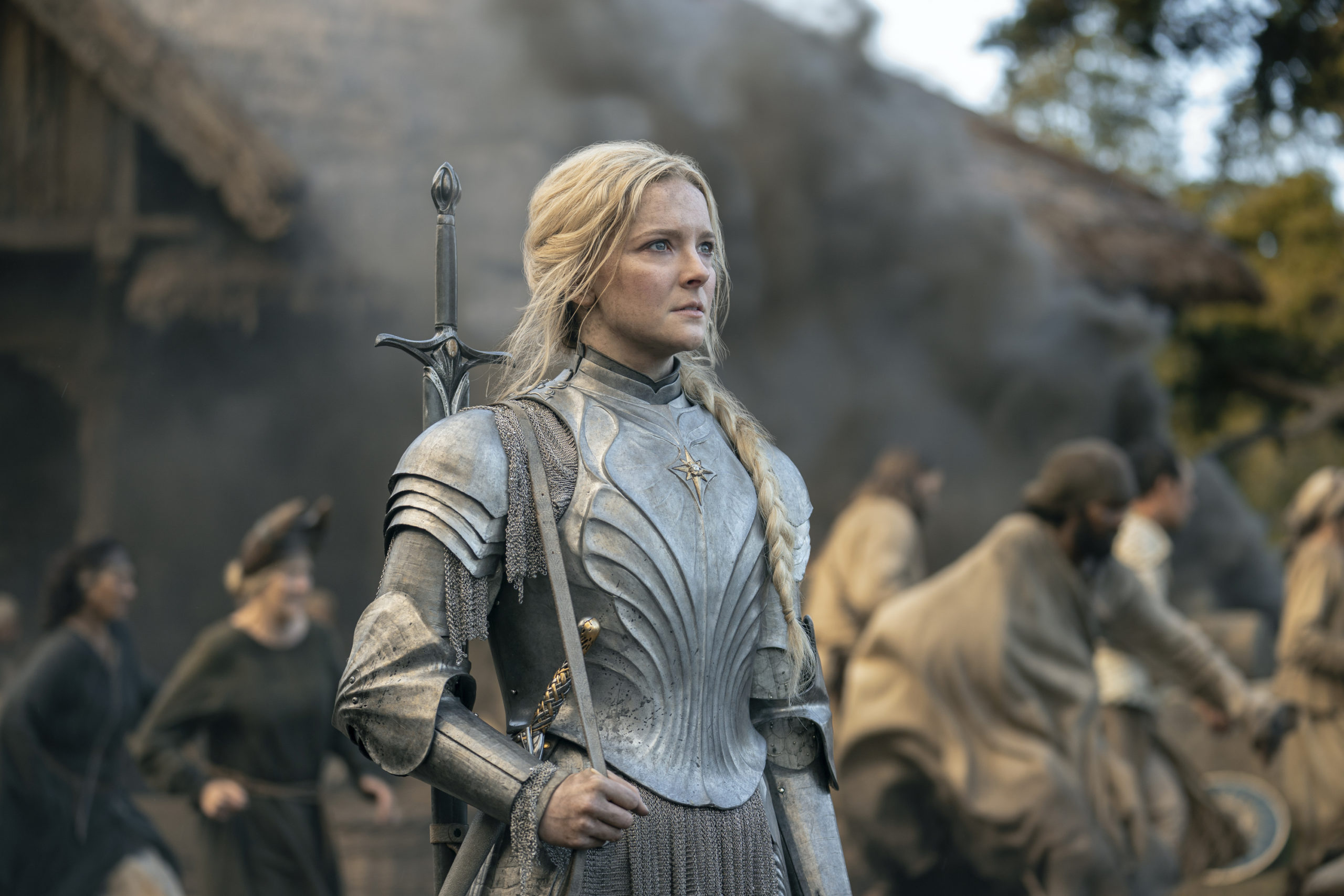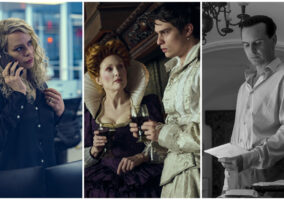
In the sixth episode of The Rings of Power, all hell breaks loose (literally) and the series takes a major jump forward with its most exciting and visually stunning episode yet. Perhaps not coincidentally, it is also the episode where the show leans as hard as possible into making comparisons to the Peter Jackson films, studding nearly every scene with Jacksonian touches. We start with Adar planting alfirin seeds and reciting, “New life. In defiance of death,” which is an alarmingly odd sentiment for an orc leader to be expressing. New life isn’t normally considered a goal of their kind. He addresses the army of orcs. “My children, we have endured much.” He goes on to mention how they “cast off our shackles,” and refers to the Southlanders as their enemies. As we’ll see, this may not be merely empty rhetoric used to whip up a crowd into a frenzy. He says that if some of them fall in this battle, they will do so, “not as unnamed slaves from faraway lands, but as brothers and sisters in our home.” Waldreg, evidently having slit Rowan’s throat, listens to the speech, looking a bit uncomfortable with his choices. The orcs march to Ostirith, the watchtower. Once again, it’s giving Junior Helm’s Deep and once again, we don’t mind. As we said last week, we like these aesthetic callbacks to the Jackson films because they defined the cinematic language of Tolkien. The orcs enter the tower courtyard, only to find it seemingly deserted. Adar notices the exposed wall carving of the black sword. Waldreg, apparently feeling bold, asks Adar where Sauron is. He doesn’t answer because people in streaming series full of mysteries aren’t expected to respond to direct questions. He says he can still smell Arondir, who promptly reveals himself by taking out a few of the orcs and firing an arrow at the buttressing holding the tower together. It’s a pretty fun scene, and a falling tower will never not evoke The Lord of the Rings. Somehow, Adar and Waldreg survive this, even though it’s shot in a way to look like they were buried by it. Keep that in mind when you consider the final scene of the episode, in which it looks like everyone dies.
The Númenorean mini-fleet is on its way and Isildur decides to wake up before the sunrise to see if he can spot the approaching land. Halbrand takes a minor interest in watching him leave. This could be nothing, but it did seem a little strange to see him linger on the kid. Later, he’ll have a brief moment where he saves Elendil’s life. We’re wondering if these little moments are meant to be minor foreshadowing. After all, both Elendil and Isildur wound up having a world-changing confrontations with Sauron during the War of the Last Alliance. We’re just saying. Anyway, Isildur gets a moment to chat with Galadriel, with whom he is clearly in awe. She in turn is intrigued by the starry-eyed stable hand, even more so after she learns that he’s Elendil’s son. He’s amazed that she can see the coast, noting “Keen are the eyes of the elves,” which is an Aragorn line from The Two Towers. Isildur tells her he joined the expedition to get as far away from Númenor has he could, because it’s not “the real Númenor” and she assures him that it still exists. Elendil meets with Queen Miriel to tell her that they have another full day of sailing and then a day’s ride to get to Ostirith.

Back in Tirharad, the Southland village, Arondir makes plans to hide the black sword hilt after confirming that it can’t be destroyed, telling Bronwyn that not even she can know where it is. The villagers prepare for the coming second attack that night. Bronwyn and Arondir try to raise their spirits but it’s looking dismal. Arondir swears that they will all see the sunrise again, which is clearly a bullshit promise and contrasts rather sharply with Adar telling the orcs that they won’t all survive the battle. Bronwyn asks Theo to stay in the tavern, protecting the women and children. He asks her to repeat what she told him when he used to be scared of bad dreams and the dark, and she gives a very Tolkien-esque speech about light and shadows (which is partially lifted from a Samwise Gamgee monologue in The Return of the King) while a very Jacksonian slo-mo montage of brave villagers plays. Arondir and Bronwyn have a moment together before the battle starts and he gives her the alfirin seeds she gave him back in episode one, telling her that planting these seeds before a battle is an elven tradition. For what it’s worth, these are the same flowers (also known as simbelmynë because literally everything in Tolkien has several names) seen growing on the tombs of Rohan in The Two Towers and they are known for flourishing over graves. “New life. In defiance of death” she repeats Adar’s words. Arondir promises that they will be together and that they will plant seeds in their own garden together after this is over. They kiss and for the first time, it’s starting to feel like some of these newly created characters won’t be making it out of this one alive. A good deal of this episode might be considered filler, because if you just list what happened, it was a very straightforward series of battles, one right after another. But for all our complaining about the slow setup of the story over the last five episodes, these moments feel earned and correct. If it’s all “Who is Sauron?” and “Why is Galadriel acting so weird?” then it’s not a story. You have to care about the people fighting and you have to care that they’re fighting for the right reasons.
The battle begins quietly, with Arondir spotting a lone torch far in the distance. There’s a bit of tension that Bronwyn will be found by a lone orc before she can light the wagon on fire, which leads to the first death of the battle and gives her a moment to wield a sword and kill another orc. Peter Jackson talked about how, when you’re shooting big battle scenes, you have to create these little stories and moments, otherwise it’s just a mass of indiscernible violence. Arondir gets another of these moments when he battles a giant orc in a pretty brutal hand-to-hand fight scene. We honestly thought he might die during this fight. When all of that black orc blood was spilling all over his face, we had a moment where we got orcs confused with zombies and feared he might turn on us, but we think that was merely a setup to remind the viewer that orc blood doesn’t look like human blood, so that the later reveal of the Southlander traitors could be conveyed visually. Arondir’s fight gets even more intense and Bronwyn saves him at the last second, just before he almost loses one of those keen elven eyes of his. For the most part, we think the show has been pretty good about showing how an untrained fighter like Bronwyn could become an orc-slayer (remember that child-sized hobbits managed to take out their fair share of them during the War of the Ring), but it did feel like the villagers all suddenly leveled up for this fight. For a moment, it looks like they might have been victorious, but of course the arrows start flying and a whole bunch of them get killed trying to get away from Adar and the orc army hiding in the woods. Bronwyn takes an arrow through the chest and everyone retreats to the tavern.

Adar is kind enough to give everyone a good five minutes as Arondir and Theo try to save Bronwyn, in a sequence with more blood in it than all three of the Lord of the Rings films combined. We’re not quite at Game of Thrones/House of the Dragon levels of violence, but we can feel the show trying to push the boundaries of Tolkien a little in order to appeal to a modern audience. The orcs, while not extensively redesigned, are much more horrifying than the Jackson versions, largely because that’s how they would appear to a bunch of scared villagers as opposed to seasoned fighters like Aragorn and Boromir, who’d been killing them for years. Anyway, Bronwyn survives because Arondir put the alfirin seeds in her wound before cauterizing it and we confess to not knowing why he did that.
The orcs eventually remember that there are people in the tavern and show up with a battering ram, but we barely had enough time to smile at the Jackson reference before another Jacksonian trope was introduced: the line of horse riders cresting the horizon just in time. What’s a bit interesting here – and it’s to the show’s credit that it slightly upended the convention a little – is that the Númenoreans don’t arrive just in time. They arrive a good six hours too late to make a difference for half the village. Still, what an insanely thrilling sequence, watching those riders – Galadriel in the lead – just barreling toward the battle at top speed. Back at the tavern, Adar arrives, asks for the black sword hilt and starts killing people when Arondir tries to stall. Just as they’re about to run a sword through Bronwyn, Theo speaks up and for a minute there, we thought this was some sort of plan between him and Arondir. Unfortunately, it was just a rebellious kid trying to save his mother because Arondir had the brilliant idea of hiding the ultimate evil weapon at the very center of the battle and also because apparently, Theo can hide from and track an Elf without being caught. Sorry, but the way they passed this clearly cursed and evil artifact around made very little character or story sense. Adar gets his hands on the hilt just as the sound of hooves can be heard thundering in the distance. He quickly takes Waldreg aside to give him orders when the Númenoreans arrive and all hell breaks loose. This battle is the most chaotic one yet, but we still got some fun or character-based moments like Valandil using Galadriel’s thrust-twist-pull maneuver before coming to Ontamo’s aid, or Galadriel pulling off some eye-popping riding while demonstrating the limits of Elven core strength, or Galadriel and a starstruck Arondir meeting face to face. It might not have come across as often as it should, but among the Elves, Galadriel is like Beyonce. She’s high-ranking and most Elves consider her at the very pinnacle of their kind. Isildur sees Elendil overcome by orcs but before he can get to him, Halbrand saves him. By this time, everyone’s fighting in full daylight and for some reason, the orcs’ weakness to sunlight seems to have been forgotten. Granted it’s early sunlight, but it’s clearly morning. Adar takes off and Arondir tells Galadriel that he can’t be allowed to leave with the item in his possession. She takes off after him and Halbrand follows after her. Now for another Jacksonian moment; the high speed elf horse chase through the woods while a choir sings. Halbrand dis-enhorses the evil elf and evidently Galadriel decided to do a loop around the forest to give them a moment, because Halbrand has enough time to stab Adar through the hand and put the spear to his throat before asking him “Do you remember me?” Adar says that he doesn’t and Galadriel arrives in time to stop Halbrand from running his spear through him. These weird little pacing moments where characters disappear from the scene for no reason are starting to add up. Adar taunts him and asks if he killed someone close to him, like perhaps a child. Galadriel gets Halbrand to put his spear away by intoning, “One cannot satisfy thirst by drinking seawater.” As Elven proverbs go, this one seems a little obtuse, but we suppose it must make sense to two people who met on a raft in the middle of the sea.

Adar is tied up in the barn and Galadriel starts off her questioning by asking him if he is one of the elves that Morgoth experimented on in order to create orcs. Tolkien gave conflicting accounts of how the Orcs came into being, but for the films, Peter Jackson settled on the most commonly accepted origin, which is that they are essentially mutated elves. This explains why the orcs call him “father.” It’s not a term of endearment, it’s literal. She asks him where Sauron is. Adar tells her that after Morgoth’s defeat, Sauron “devoted himself to healing this world, bringing these ruined lands together.” They’re really playing with the idea that the characters we think of as evil do not think of themselves that way. Tolkien in his extended writings and letters was sometimes surprisingly flexible on the idea that the creatures he called evil, such as the orcs, could be rehabilitated, although it’s not all that strongly expressed in the stories. To Adar, he is a father seeking to protect his children and find them a home and Sauron was apparently someone who tried to make the world better before being corrupted by dark magic. For the record, that latter perspective is very much not true. “He sought to craft a power not of the flesh, but over flesh,” Adar says of Sauron, “The power of the unseen world.” When Tolkien talked of the unseen world, he was referring more or less to the spirit world or the realm of magic. It’s where the Nazgûl reside. One of the powers of the One Ring, as demonstrated repeatedly in the trilogy, was that it gave the bearer the ability to see and walk in the unseen world. Adar tells Galadriel that despite Sauron’s efforts, there was a “shadow of dark knowledge that kept itself hidden even from him,” which should serve to explain why he wants to create the One Ring. Adar claims that he killed Sauron for torturing of his orc children in his experiments. Galadriel immediately states that she does not believe him and takes issue with him referring to the orcs as children. “They are not children, they are slaves,” she says, as if the two were mutually exclusive. He counters that each of them have names, reminding her that her need to treat the orcs as one mass of evil is incorrect and inhuman of her. “We are creations of the One, master of the Secret Fire, the same as you; as worthy of the breath of life and just as worthy of a home,” he tells her. This is a reference to the creator, Eru, who gave life to the elves and humans through the Flame Imperishable or the Secret Fire. Gandalf calls himself a “servant of the Secret Fire” in his iconic confrontation with the Balrog in The Fellowship of the Ring. This is Adar’s way of telling her that despite their twisted origins, orcs are living creatures. Galadriel responds to Adar with invective. “Your kind was a mistake; made in mockery. And even if it takes me all of this Age, I vow to eradicate every last one of you. But you shall be kept alive, so that one day, before I drive my dagger into your poisoned heart, I will whisper in your piked ear, that all your offspring are dead and the scourge of your kind ends with you.” He notes that he’s not the only elf who has been transformed by darkness and she immediately reveals the emptiness of the vow she just made by moving to kill him. Halbrand stops her for some reason and she stomps out. “Who are you?” Adar asks Halbrand, who doesn’t answer. We’re starting to see the themes of the series coalesce a little more; not just that Galadriel has been touched by darkness after centuries of hunting it, but that her ego and blindness, along with a worldwide epidemic of xenophobia, racism and mistrust, is ultimately what creates the situation that allows Sauron to rise to power. In a lot of ways, it’s like the Star Wars prequels, except with an attempt at considerably more nuance.
Galadriel and Halbrand have a moment where they reveal their feelings for each other and WE HATE IT. First, there’s this weird thing where they each thank the other for “pulling me back,” as if killing Adar was some sort of red line that shouldn’t be crossed, even after they each slaughtered dozens of orcs. Second, Elf-human love stories were incredibly rare in Tolkien for a reason: it’s impossible for immortal beings who are thousands of years old to have happy, healthy relationships with people who die in less than a century. There were only three consummated Elf-human love stories in the entire Tolkien mythos, but this series has almost doubled that number. Never mind that Galadriel is supposed to be married to Celeborn by now. Forget that she is LITERALLY OLDER THAN THE SUN. This development doesn’t scan for a whole lot of reasons, but it lands especially flat because there’s already a much better, more fully realized Elf-human pairing in Bronwyn and Arondir. The only thing that will save this development is the one thing that seems most obvious about where it’s heading. By the conclusion of this scene we went from idly wondering if Halbrand was Sauron to fervently hoping it to be so. All we ask is that they not kiss before she figures it out. By the way, have you noticed that Halbrand is wearing ring armor? WE’RE JUST SAYING.

The villagers somehow manage to clear out all of the dead bodies and find food enough to mount a celebration for the Númenoreans. Arondir introduces Bronwyn to Miriel, who salutes her leadership and tells her that she can provide her some relief from all of her responsibilities. She introduces Halbrand to her and Bronwyn immediately recognizes the pendant that is, for some reason, dangling from his hip. He only hesitates a second before affirming to her that he is the king they’ve all been waiting for, his former reluctance all but evaporated. The crowd goes wild and salutes him as their king. For some completely bizarre reason, Galadriel gives Arondir the black sword hilt back (or at least, the package last seen containing it). He, for some even weirder reason, decides to give it to Theo after Theo tells him that the item is calling to him. “When it was in my hands, I felt powerful.” Arondir tells him to give it to the Numenoreans to toss into the sea on their voyage home. None of this makes any sense, but we guess they had to pass it back and forth to get to that reveal – and to be fair, it was a doozy. Adar switched out the sword and gave it to Waldreg, who is back at the ruined watchtower, where he thrusts the full sword into a lock in the stone that causes the dams to fail, forcing the river to empty into the tunnels the orcs have been digging. The tunnels lead directly Orodruin, the mountain which will one day become known as Mount Doom. Well, it looks like that day has arrived. The captured orcs all start chanting “Udûn,” which is the Sindarin word for hell, but also (because everything in Tolkien has more than one meaning) will one day refer to a valley in Mordor that will lead to Barad-dûr, Sauron’s tower. Adar’s plan was to blot out the sun in the Southlands, giving his sun-averse children a home, but it also winds up creating the forge that will allow Sauron to craft the One Ring, a major factor in his pursuit of power over the unseen world. In other words, Adar’s plan benefits himself and his children, but it provides way more benefit to the being he claims to have killed. Galadriel stands motionless before the devastation, realizing that she’s been played and that the world will pay for her mistakes. In a rather stunning display of visual effects, everybody dies in a cloud of smoke, ash and fire. Evidently!
Variety’s Power of Women Event Red Carpet Rundown Next Post:
Paris Fashion Week: Schiaparelli Spring 2023 Collection
Please review our Community Guidelines before posting a comment. Thank you!



